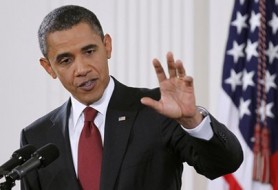WASHINGTON, (Reuters) – A chastened U.S President Barack Obama today pledged to seek compromise with Republicans who won big in congressional elections and admitted he had lost touch with voters who delivered a “shellacking” to him and his Democrats
But on issue after issue, Obama gave little ground on his positions as the two sides gear up for negotiations over how to tackle the sluggish economy, the main reason the electorate has soured on his leadership.
At a White House news conference, Obama confessed to having suffered a long night yesterday as Republicans seized control of the House of Representatives and made gains in the Senate, handing him the biggest defeat of his career and threatening to block his agenda for the second half of his term.
“I feel bad,” the subdued president said when asked to reflect on the drubbing his party took at the polls.
While stressing his commitment to seek common ground on issues like tax cuts and energy policy with Republican opponents he has battled for two years, Obama made clear there were some lines he would not cross on his main policy items.
“I’m not suggesting this will be easy,” Obama said. “I won’t pretend that we’ll be able to bridge every difference or solve every disagreement.”
Gone was the campaign rhetoric in which Obama skewered Republicans for wanting to take the country back to economic policies he believes have been discredited. Looking tired, Obama spoke in a quiet monotone, with an occasional smile.
Asked if he had lost touch with Americans, Obama said that “in the rush of activity sometimes we lose track of the ways that we connected with folks that got us here in the first place.”

With his cerebral style and soaring oratory , Obama inspired voters’ trust during the presidential campaign in 2008. But, in office, his “no-drama Obama” demeanor has sometimes come across as detached from people’s economic pain.
Obama said a readjustment in thinking in response to political setbacks is something every president must face. “Now I’m not recommending to every future president that they take a shellacking like I did last night,” he said wryly. “I’m sure there are easier ways to learn these lessons.”
Republicans picked up at least 60 House seats in the biggest shift in power since Democrats gained 75 House seats in 1948. The election outcome put pressure on Obama to make a mid-course correction as he seeks to reduce the 9.6 percent jobless rate and prepares to seek re-election in 2012.
Obama largely stuck to positions that he held before the elections. He said it is a top priority for Congress to extend expiring Bush-era tax cuts only for those making $250,000 or less. Republicans also want the tax cuts kept in place for wealthier Americans making above that amount as well.
Obama said he will sit down with congressional leaders in coming weeks to see how to move forward on extending tax cuts.
He said he did not believe the U.S. election result was a repudiation of his sweeping healthcare overhaul. But he signaled he was willing to work with Republicans on “tweaks.” Republicans have vowed to repeal the healthcare law, something considered unlikely because of Obama’s veto power.
“If the Republicans have ideas for how to improve our healthcare system, if they want to suggest modifications that would deliver faster, more effective reform … I am happy to consider some of those ideas,” Obama said.
Obama, whose former Illinois Senate seat went to a Republican, said he has made progress on the economy but believed “people are frustrated” by weak economic conditions.
“Clearly too many Americans haven’t felt that progress yet, and they told us that yesterday. And, as president, I take responsibility for that,” he said.
Obama said Americans are worried by spending and deficits, but the country should not cut funding for education or research while trying to bring the deficit down.
“In these budget discussions, the key is to be able to distinguish between stuff that isn’t adding to our growth, isn’t an investment in our future, and those things that are absolutely necessary for us to be able to increase job growth in the future as well, he said.
Obama acknowledged the need for what one questioner called a “reset” in his relations with U.S. business. Some corporate executives have accused his policies of being anti-business.
And Obama conceded that his chances of getting Congress to pass comprehensive climate change legislation, strongly opposed by Republicans, were “doubtful” for the rest of his term.



